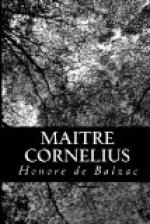“A-men!”
To that response, sung in a sweet low voice which was painfully agitated, though happily lost in the general clamor, she added rapidly in a whisper:—
“You will ruin me.”
The words were said in a tone of innocence which a man of any delicacy ought to have obeyed; they went to the heart and pierced it. But the stranger, carried away, no doubt, by one of those paroxysms of passion which stifle conscience, remained in his chair and raised his head slightly that he might look into the chapel.
“He sleeps!” he replied, in so low a voice that the words could be heard by the young woman only, as sound is heard in its echo.
The lady turned pale; her furtive glance left for a moment the vellum page of the prayer-book and turned to the old man whom the young man had designated. What terrible complicity was in that glance? When the young woman had cautiously examined the old seigneur, she drew a long breath and raised her forehead, adorned with a precious jewel, toward a picture of the Virgin; that simple movement, that attitude, the moistened glance, revealed her life with imprudent naivete; had she been wicked, she would certainly have dissimulated. The personage who thus alarmed the lovers was a little old man, hunchbacked, nearly bald, savage in expression, and wearing a long and discolored white beard cut in a fan-tail. The cross of Saint-Michel glittered on his breast; his coarse, strong hands, covered with gray hairs, which had been clasped, had now dropped slightly apart in the slumber to which he had imprudently yielded. The right hand seemed about to fall upon his dagger, the hilt of which was in the form of an iron shell. By the manner in which he had placed the weapon, this hilt was directly under his hand; if, unfortunately, the hand touched the iron, he would wake, no doubt, instantly, and glance at his wife. His sardonic lips, his pointed chin aggressively pushed forward, presented the characteristic signs of a malignant spirit, a sagacity coldly cruel, that would surely enable him to divine all because he suspected everything. His yellow forehead was wrinkled like those of men whose habit it is to believe nothing, to weigh all things, and who, like misers chinking their gold, search out the meaning and the value of human actions. His bodily frame, though deformed, was bony and solid, and seemed both vigorous and excitable; in short, you might have thought him a stunted ogre. Consequently, an inevitable danger awaited the young lady whenever this terrible seigneur woke. That jealous husband would surely not fail to see the difference between a worthy old burgher who gave him no umbrage, and the new-comer, young, slender, and elegant.
“Libera nos a malo,” she said, endeavoring to make the young man comprehend her fears.




